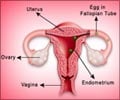Ovulating women seem to prefer to have minimal or no contact with their fathers, reveal researchers at UCLA, the University of Miami and Cal State, Fullerton.

"Women call their dads less frequently on these high-fertility days and they hang up with them sooner if their dads initiate a call," said Martie Haselton, a UCLA associate professor of communication in whose lab the research was conducted.
Because they did not have access to the content of the calls, the researchers are not able to say for sure why ovulating women appear to avoid father-daughter talks.
They say the behavior may be motivated by an unconscious motive to avoid male control at a time when the women are most fertile.
But a more primal impulse may be at work: an evolutionary adaptation to avoid inbreeding. Whatever the case, the researchers know that the findings are consistent with past research on the behavior of other animals when they are at their most fertile.
"Evolutionary biologists have found that females in other species avoid social interactions with male kin during periods of high fertility," said the study's lead author Debra Lieberman, a University of Miami assistant professor of psychology.
Advertisement
The findings appear in the latest issue of "Psychological Science," a prominent peer-reviewed scholarly journal.
Advertisement








